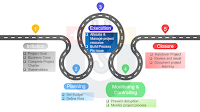The 5 basic phases in the project management process are:
- Project Initiation
- Project Planning
- Project Execution
- Project Monitoring and Controlling
- Project Closing

1. Project Initiation: Starting a project:
Before you start the project, you should figure out if it's worth doing. If you're not sure why the business wants or needs this project, you should test if it's possible.
Questions to think about at the start of a project:
- Can we do this project?
- What's the main goal?
- What problems are we fixing?
- What are we trying to do?
- How would we know if it worked?
- Who else is involved?
Use the SMART goal framework to identify your project goals. The acronym SMART stands for:
S – Specific: Clearly define and unambiguously state your objectives.M – Measurable: Your progress towards your goals should be measured using specific criteria.A – Attainable: Do not set unrealistic goals.R – Relevant: Objectives should be realistic and achievable within your business.T – Time-bound: There should be a clear beginning and end date for your goals.
2. Project Planning:
Once you've defined the project on a broader level, it's time to nail down the details.
During this phase, the project manager develops a detailed plan for executing, monitoring, and controlling the project. This typically starts with setting goals.
Goal setting can be accomplished in several different ways. The three common project planning strategies are SMART goals, CLEAR goals, and objectives and key results (OKRs).
Note:
- The acronym C.L.E.A.R. stands for Collaborative, Limited, Emotional, Acceptable, and Refined.
- The acronym OKRs stands for objectives and key results.
3. Project Execution: It's time to start working!
- Typically, the third stage kicks off with a meeting, after which each team and its members will start tackling their tasks.
- During the execution phase of a project, the team focuses on achieving the established objectives through collaboration and teamwork.
- this is the longest phase of the project management life cycle, where most resources are applied.
- Start executing the project management roadmap/plan
- Establish workflows, assign tasks to team members, and ensure that everyone is on track
- Keep stakeholders and teams in the loop as the project progresses.
4. Project Monitoring and Controlling
- It run with project execution to ensure that objectives are met.
- This phase involves tracking, reviewing, and regulating the progress and performance of the project.
- It is important to ensure that everything is in line with the project management plan.
Questions to ask during the performance and monitoring phase:
- What is the quality of the project?
- Where are we in terms of budget?
- Are we on schedule?
- Are there any roadblocks?
- Are we still projected to meet the deadline?
